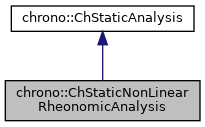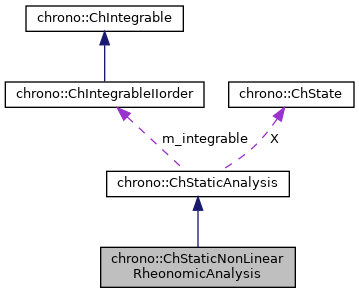Description
Nonlinear static analysis for a mechanism that is rotating/moving in steady state.
If SetAutomaticSpeedAndAccelerationComputation(true), the rotation/movement, if any, is automaticlally assigned via rheonomic constraints. Consider for example, an elastic turbine blade that rotates via a ChLinkMotorRotationAngle: the motor will impose a steady state rotation that creates centrifugal forces, so the analysis will generate an elongated blade (the ChStaticNonLinearAnalysis cannot capture centrifugal and gyroscopical effects because it resets all speeds/acceleration to zero during its iteration). WARNING: at the moment this is ok only for undeformed finite elements! If automatic computation of speed and acceleration is set to false, it is up to the user to provide an iteration callback that keeps the speeds and accelerations updated as needed.
#include <ChStaticAnalysis.h>


Classes | |
| class | IterationCallback |
| Callback interface for updating the system at each iteration. More... | |
Public Member Functions | |
| void | SetVerbose (bool verbose) |
| Enable/disable verbose output (default: false). | |
| void | SetMaxIterations (int max_iters) |
| Set the max number of iterations for the Newton Raphson procedure (default: 10). | |
| void | SetCorrectionTolerance (double reltol, double abstol) |
| Set stopping criteria based on WRMS norm of correction and the specified relative and absolute tolerances. More... | |
| void | SetResidualTolerance (double tol) |
| Set stopping criteria based on norm of residual and the specified tolerance. More... | |
| int | GetMaxIterations () const |
| Get the max number of iterations for the Newton Raphson procedure. | |
| void | SetCallbackIterationBegin (std::shared_ptr< IterationCallback > callback) |
| Set the callback to be called at each iteration. | |
| void | SetAutomaticSpeedAndAccelerationComputation (bool val) |
| Enable automatic calculation of system velocities and accelerations from rheonomic constraints (default: false). More... | |
 Public Member Functions inherited from chrono::ChStaticAnalysis Public Member Functions inherited from chrono::ChStaticAnalysis | |
| ChIntegrable * | GetIntegrable () |
| Get the integrable object. | |
| const ChState & | GetStatePos () const |
| Access the state, position part, at current analysis. | |
| const ChVectorDynamic & | GetLagrangeMultipliers () const |
| Access the Lagrange multipliers, if any. | |
Friends | |
| class | ChSystem |
Additional Inherited Members | |
 Protected Member Functions inherited from chrono::ChStaticAnalysis Protected Member Functions inherited from chrono::ChStaticAnalysis | |
| void | SetIntegrable (ChIntegrableIIorder *integrable) |
| Set associated integrable object. | |
 Protected Attributes inherited from chrono::ChStaticAnalysis Protected Attributes inherited from chrono::ChStaticAnalysis | |
| ChIntegrableIIorder * | m_integrable |
| ChState | X |
| ChVectorDynamic | L |
Member Function Documentation
◆ SetAutomaticSpeedAndAccelerationComputation()
|
inline |
Enable automatic calculation of system velocities and accelerations from rheonomic constraints (default: false).
Attention: currently, this is working only for non-stretched finite elements. If not enabled, you can use an IterationCallback to update the speeds and accelerations in the caller code.
◆ SetCorrectionTolerance()
| void chrono::ChStaticNonLinearRheonomicAnalysis::SetCorrectionTolerance | ( | double | reltol, |
| double | abstol | ||
| ) |
Set stopping criteria based on WRMS norm of correction and the specified relative and absolute tolerances.
This is the default, with reltol = 1e-4, abstol = 1e-8. The Newton Raphson procedure is stopped if the WRMS norm of the correction vector (based on the current state) is less than 1.
◆ SetResidualTolerance()
| void chrono::ChStaticNonLinearRheonomicAnalysis::SetResidualTolerance | ( | double | tol | ) |
Set stopping criteria based on norm of residual and the specified tolerance.
The Newton Raphson is stopped when the infinity norm of the residual is below the tolerance.
The documentation for this class was generated from the following files:
- /builds/uwsbel/chrono/src/chrono/timestepper/ChStaticAnalysis.h
- /builds/uwsbel/chrono/src/chrono/timestepper/ChStaticAnalysis.cpp
